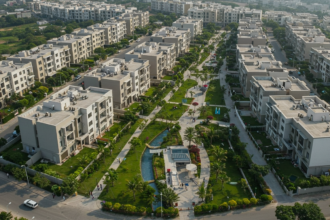Pakistan’s real estate sector is abuzz following Prime Minister Shehbaz Sharif’s recent call for comprehensive marketing and investment strategies for ongoing housing projects. This directive, issued on Monday, January 20, 2025, signals a renewed focus on addressing the country’s housing deficit and potentially reshaping the market landscape. But what are the key takeaways, and what impact can we expect?
Key Points from the PM’s Directive
Emphasis on Marketing
The PM stressed the importance of effective marketing strategies to attract both domestic and international investors. This suggests a shift towards more proactive promotion of housing projects, potentially through digital campaigns, international roadshows, and partnerships with real estate agencies.
Focus on Investment
The core message was the need for robust investment plans. This implies a government push to create a more favorable investment climate, possibly through tax incentives, streamlined regulations, and public-private partnerships.
Addressing the Housing Deficit
While not explicitly stated in the initial reports, this initiative is clearly linked to the ongoing efforts to tackle Pakistan’s significant housing shortage. By attracting investment and boosting project completion, the government aims to provide more affordable housing options for its citizens.
Insights and Potential Impact
Increased Foreign Investment
A well-executed marketing campaign targeting international investors could bring much-needed foreign capital into the sector. This could lead to the development of larger-scale, more sophisticated housing projects.
Boost in Construction Activity
Increased investment will naturally translate into greater construction activity, creating jobs and stimulating related industries like cement, steel, and building materials.
Improved Housing Affordability
While the focus is on attracting investment, the ultimate goal is to increase the supply of housing units. If successful, this could help moderate housing prices and make homeownership more accessible to a wider segment of the population.
Enhanced Regulatory Framework
To attract serious investment, the government will likely need to further improve the regulatory framework governing the real estate sector. This could involve streamlining approval processes, increasing transparency, and strengthening consumer protection measures.
Challenges and Considerations
Economic Stability
Maintaining macroeconomic stability is crucial for attracting long-term investment. Fluctuations in currency exchange rates and inflation can deter potential investors.
Security Concerns
Addressing security concerns and ensuring a stable political environment are essential for building investor confidence.
Implementation Efficiency
Effective implementation of the marketing and investment plans is key. Bureaucratic hurdles and delays can undermine even the best-laid plans.
Conclusion
The Prime Minister’s call for strategic marketing and investment in housing projects represents a significant development for Pakistan’s real estate sector. If implemented effectively, this initiative has the potential to unlock substantial growth, address the housing deficit, and create a more dynamic and inclusive housing market. The coming months will be crucial in observing how these plans are translated into concrete actions and the resulting impact on the ground. This move could be a game-changer, but its success hinges on consistent effort and a commitment to creating a truly investor-friendly environment.




